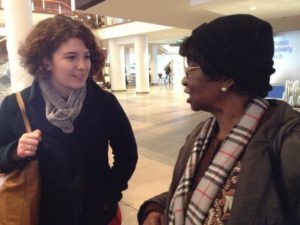Please note: this post is 114 months old and The Cares Family is no longer operational. This post is shared for information only
Hannah started volunteering at our Social Clubs in October. Read her insightful blog about how taking time to get to know her older neighbours has helped her to combat the unfriendliness which London requires as self defence. We can all benefit from the simple act of conversation with people you wouldn't usually hang out with, and at the same time help your older neighbours to feel more valued and visible in this buzzing capital of ours.
Sometimes, I am a city schmuck. I tut at people in my way, dodge round people to get out the tube quicker. I roll my eyes when people stand on the left of the escalator.
Despite having grown up in Oxfordshire, where all the clubs closed by 3, and the last hourly night bus was 5 minutes after that, I moan when I wait for a train for more than 5 minutes, or when I can’t find late night food.
I try and combat this city-schmuckness by holding open doors, carrying babies when someone is struggling with a pushchair, helping decode the tube map.
But the nature of the city almost requires unfriendliness as self-defence. London is a competitive city, with its extortionate rents and higher cost of living making survival competitive. It is hard to not be drawn into the rush. We are rewarded for hurrying by being seen as more efficient, and fitting more into our days.
Once you have mounted this carousel of manic living, it is difficult to disembark. When you try and become more considerate, someone else pushes past and your mood darkens. When you try slow the pace, you worry about what you might be missing out. Taking time to get to know neighbours is sacrificed for swiping for conveniences. In our rush to be everywhere, seeing everyone, we are isolating ourselves.
Cities are lonely, but it’s not just us that suffer. As John Lewis’ christmas advert reminds us, being older is even more isolating. When you can no longer compete in the race of getting to places, you fall by the wayside. As your area changes and rebuilds rapidly around you, it can be difficult to keep up with where things are, and who is who. And suddenly people treat you differently, condescend, although you are still you.
And this is symptomatic of a wider cultural crisis. Our educational system is incredibly self-focused. We are taught to pursue what we want, to prize the new and fresh. We are encouraged at work to ensure our voices are heard. We aren’t prepared for the day that people won’t want to listen to us, that our contributions will be considered irrelevant.
Having tried mindfulness, meditation, yoga, meetups and making more plans, I decided to try and combat my own loneliness, and get a feel good buzz, by volunteering with South London Cares.
Aiming to encourage older neighbours and young professionals to meet at informal social clubs and one-to-one, I was drawn to an opportunity to get that “I’m a good person” buzz that would fit in around my slightly unpredictable and erratic day-to-day.
In just two social clubs, I’ve found myself back in touch with my humanity, through the simple act of conversation.
At a pizza-making workshop and lunchtime concert, I have met a wider variety of people than the never-ending parade of people to scroll through on [location-based dating app] happn.
From a man who has been to 56 countries and taught me to make geometric repeating patterns, to a woman who performed at the Southbank Centre during Festival 51, I have been fortunate to have met and chatted with a really exciting and interesting group of people. People such as Fred and Lupita.
It’s not difficult to focus on listening for a bit, when the people you’re listening to have so many interesting stories to offer. And once you start focusing on listening, it’s amazing how much better at it you become.


Meeting with my neighbours has slowed me down, and encouraged me to reflect. Despite the portrayals of a generational war, of baby-boomer ‘greedy haves’ and millennial ‘entitled have-nots,’ I (unsurprisingly) found my neighbours to be friendly.
They agree with a bit of improvement around Brixton, such as more accessible supermarkets and a wider variety of ‘places for young people to go’ in the market, but don’t like that so many local businesses are being threatened with rising rents.
In just a couple of hours, I have been given so many diverse perspectives I can’t help but feel I’m the one profiting from spending time with my neighbours. I’ve met one of the first generation of migrants from the West Indies, and a woman who spent the past couple of decades caring for her mother. These people are inspiring – but their stories are sidelined, unheard.
I can selfishly say that the chance to sit down and genuinely listen to people with such varied backgrounds has been of enormous benefit to me. Stopping the rush to just listen and reflect has made me less stressed, and realigned my priorities. The thing about older people is they’re just people; with more experience, more stories, but an often smaller audience.
As we all march on to the inevitable end-of-year assessments, do we want to measure our year based on the volume of people we met, places we went, and meetings we held, or should we instead strive to find the value in the conversations we had, and the connections we made? I for one will be sharing my Christmas as much as I can.
Hannah's blog was first published here.